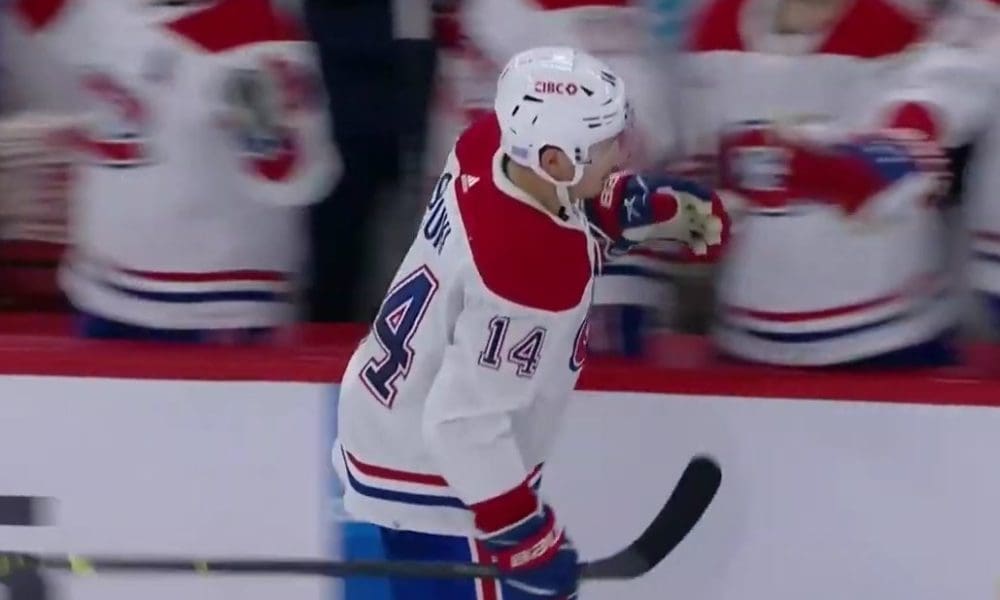Montreal Canadiens
Canadiens Suzuki Hits 50 Points In Second Consecutive Season

Montreal Canadiens captain Nick Suzuki reached the 50-point mark for the second consecutive season.
He did so by setting up two goals in Monday night’s matchup against the Colorado Avalanche, pushing his season totals to 21 goals and 30 assists in 67 games.
In a season where health is a rare commodity and offensive production is hard to come by, Suzuki has stood out as one of the few bright spots in the Canadiens’ lineup.
By earning his 50th point of the year, Suzuki became the first Habs player since Saku Koivu to register consecutive 50-point seasons before his 24th birthday.
Worthy Comparison
Some may scoff at the mention of former Canadiens captain Saku Koivu, but there’s merit to the comparison.
Much like Koivu, Suzuki is oftentimes the lone source of offence in the Canadiens lineup, garnering significant defensive coverage from his opponents on the road, while also playing a shutdown role at home, the type of usage that is simply not conducive to scoring.
They’re both creative, playmaking centres who earned the captaincy through honest efforts and a stoic approach to dealing with the media. Both Koivu and Suzuki let their play on the ice do the talking, preferring to lead by example rather than taking a bombastic approach to the captaincy.
They also command respect, rather than demanding it, a small, yet important distinction when it comes to establishing effective leadership in an NHL locker room.
Of course, there are differences.
Suzuki is a better goal-scorer, whereas Koivu was closer to a pure playmaker.
Suzuki may not be as quick on his skates as Koivu was, however, he’s much better at controlling the pace of the game by dominating the neutral zone.
🗣️ "a classic Koivu move"
Everyone wish Saku Koivu a happy birthday and tell him what a beautiful goal this is! pic.twitter.com/PkBbOiMvrM
— NHL (@NHL) November 23, 2020
But most importantly, Suzuki is a beacon of health on what is otherwise a roster that would compete with the black plague in terms of total victims.
Koivu, on the other hand, required knee surgery in 1996 after a blistering start to the season that put him on pace to earn over 100 points, which would have been good enough or third overall in scoring, behind Mario Lemieux (122 points) and Teemu Selanne (109 points).
His potential was decimated by the knee injury, but the fact remains Saku Koivu was a dominant player in his prime, which should alleviate some of the anxiety when Suzuki and Koivu are mentioned in the same breath.
It’s also worth remembering that despite the knee injuries and cancer diagnosis, Koivu finished his time with the Canadiens as a top 10 points producer, the only player who did not play on a dynasty team to finish among the team’s top 10 scorers.
Being compared to Koivu should be taken as nothing but the utmost compliment.
Brass Tacks
The biggest issue during Koivu’s tenure with the Canadiens was the lack of insulation provided by management
By the time he entered his statistical prime, he was more or less left to his own devices, dragging his team to a point that can only be described as mediocre, consequently leading to mediocre draft positions.
Players like Alex Kovalev, Tomas Plekanec, and Andrei Markov provided as much support as realistically possible, but for the most part, the teams he played on lacked the type of star power necessary to succeed in the NHL.
Things are a little different for Suzuki.
He has an elite sniper at his disposal in Cole Caufield and support from a big, possession-driving centre on the second line in Kirby Dach.
It’s a good start, and players like Lane Hutson and Sean Farrell should eventually help Suzuki reach a new level once they earn a job in the NHL.
Not to mention, the Canadiens are set to draft yet another talented prospect in the first round of the 2023 Draft.
But as we saw with Koivu, potential can quickly turn to frustration if areas of weakness are not properly addressed. A single hit can turn a team’s rebuild plans into a decade-long slog, essentially wasting the prime years of crucial players who were circled as the next great hope.
A team that’s good, but not great, is not conducive to playoff success.
There comes a time when a certain amount of risk will be necessary to bring the team a sustained run of success.
That time is still a few years away, but it’s a lesson worth keeping in mind as we watch Suzuki evolve in the NHL.

